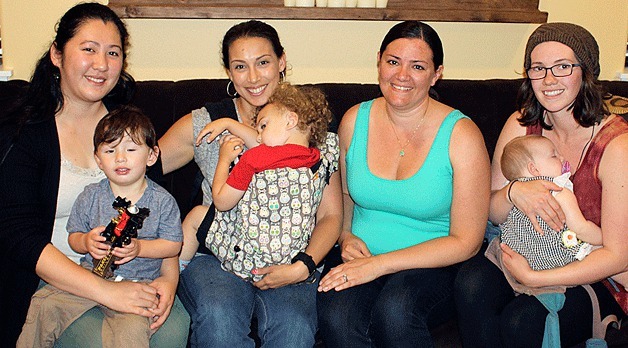From placenta encapsulation to newborn photography, pregnancy doulas to new parent support groups, Island Birth Association has assembled a conglomerate of local resources to assist parents and expectant mothers in whatever they may need.
The organization, which launched in March, is the brainchild of founders Abigail Gross, Erica Coulter, Ginger Cullen and Kim Graves, all of whom are mothers and birth work professionals.
Within the first month of operation, the association had attracted 20 new members, and over 100 women had joined the group’s Facebook page, Pregnant and Postpartum Whidbey.
The nonprofit maintains a website and blog, including a list of current association members, as well as upcoming events.
Association members include medical providers, doulas, mental health care providers, naturopaths, chiropractors and acupuncturists. There are also a number of support groups and resources concentrating on topics like childbirth and breastfeeding, as well those geared toward specific groups like military families, or those struggling with perinatal mood and anxiety disorders.
In order to become a member, businesses must agree to uphold the standards of the Mother-Friendly Childbirth Initiative.
The initiative was developed by the Coalition for Improving Maternity Services, and promotes “evidence-based mother-and-baby-friendly maternity care.”
Empowerment, support and education for mothers and families are core goals for the coalition, as well as Island Birth Association.
The women became acquainted after attending local events and conversing in community forums online.
“We all had a vision of being a central place where people can find information,” Graves said.
Cullen, an advocate for pregnant women, and Coulter, a birth advocate and birth doula, each said they would often be asked by friends or acquaintances for referrals to birth-related services.
“There wasn’t a one-stop resource to help people and families on the island,” Coulter said. “That was my initial thought: make this easier for families, so if you’re expecting or postpartum, you can go to one place and find all these resources instead of relying on maybe happening to know somebody or you happen to find something online.”
Graves said the association could also be a boon to businesses, especially those without an online presence.
The group will afford birth work professionals a chance to network and work together to improve the birth and parenting experience for area women and families, Cullen said.
The women noted that the popularity of alternative pregnancy, birth and postpartum services like the use of a doula have increased in recent years.
“It’s not just for a certain type of person anymore. It’s for everybody, and people are realizing that,” Cullen said.
Coulter added that, when she gave birth to her youngest son, she was often met with surprise when telling people of her home birth — and the fact that insurance covered the associated services, including a doula.
“I don’t think it’s for everybody at all, or that everybody needs to have a home birth. It’s wherever you’re most comfortable. But people didn’t even know it was an option,” she said.
The women credited the 2008 documentary “The Business of Being Born” for its role in bringing birth issues and awareness of alternative birth methods to the forefront of mainstream conversation.
Gross, a birth and postpartum doula and founder of Whidbey Island Babywearers and Sojouner’s Circle, noted that there has also been a political movement among women seeking to take back control of the birth process.
“I think the rising cesarian rate is a big part of that. We’re seeing basically one in three women have had a major surgical birth, and it doesn’t seem like that is something that’s necessary,” Coulter said. “We’re questioning what’s leading up to that, and what choices can I make to decrease the chance of that happening to me.”
Coulter added that many women end up feeling they have fewer options with their first birth than they had expected, and seek alternative methods for subsequent births.
“Change comes from the consumer, so I think educating consumers on their choices is going to long-term be what makes those changes and makes childbirth a better experience, with better options available to women,” Graves said.
For more information on Island Birth Association, visit www.islandbirth.org



